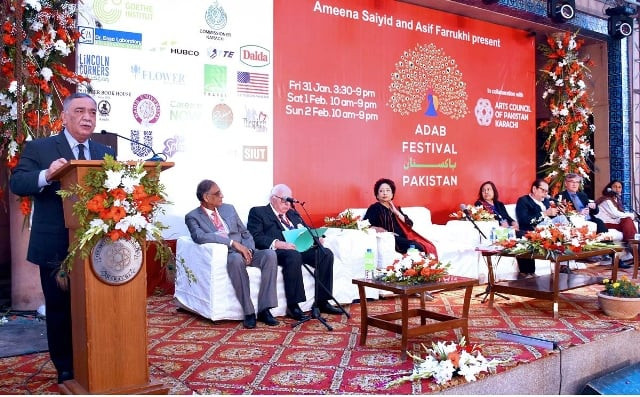Adab Fest highlights the power of literature
Literature goes beyond just artists and writers, says former CJP Khosa

PHOTO: APP
"In the last 22 years, we have dealt with 57,000 cases. Whether it's military court cases or the Panama Papers, the Aasia Bibi case or the case against former prime minister Yousuf Raza Gilani, we resorted to the sayings of literary figures as we decided our cases," said the judge in his keynote speech at the opening ceremony of the three-day Adab Festival, being held at the Arts Council.
For Khosa, literature is a form of communication that assumes the status of art, but it is not limited to artists or writers alone. He himself has used Hemingway and Mario Puzo, Shaw and Bacon in his own judgments, while judges have engaged in poetic back-and-forths with lawyers. For Aasia Bibi, it was Shakespeare's Lear he turned to: "more sinned against than sinning."
And literature, he says, is more than just art - it is a catalyst spurring change. Charles Dickens, for example, triggered improved legislation with his writings, while Uncle Tom's Cabin transformed attitudes towards slavery in the US.
Meanwhile, former ambassador Maleeha Lodhi, in her keynote speech, stressed the need to move beyond military power and economic wealth and focus on multipolarity, networks and coalitions when it came to the international arena.
"Our diplomacy should be about public perceptions abroad. It must be nimble and imaginative and capture the imaginations of people," she emphasised, adding that it was critical because the voices of citizens have been amplified in today's world.
In her opinion, our foreign policy must be shaped according to the global landscape. This is where soft power and culture, based on art, literature and heritage, come in, according to her.
"We have a boring version of diplomacy. We need to break out of it," the diplomat said. "The foreign ministry and diplomats should do a course: 'know your country.' They should hear the voices in Karachi and other cities - that is Pakistan's soft power." Cultural diplomacy, she believes, is crucial for advancing foreign policy.
Ameena Saiyid, the co-founder of the Adab Festival, claimed that literature festivals in Pakistan, begun a decade ago, had become a thriving movement. She told the audience to look out for interactive sessions on mental health, sessions aimed at the youth, and literary tours around the city that will take place after the festival, where people will be able to visit the spots where literature was written or where literary scenes were set.
Asif Farrukhi, who is also a co-founder for the festival, awarded the Infaq Foundation Award for poetry to Mir Ahmed Navaid, who will also participate in a mushaira at the Adab Fest today (Saturday). The second iteration of the festival, which also features panel discussions, book launches and a number of performances, will end tomorrow.
Published in The Express Tribune, February 1st, 2020.


















COMMENTS
Comments are moderated and generally will be posted if they are on-topic and not abusive.
For more information, please see our Comments FAQ